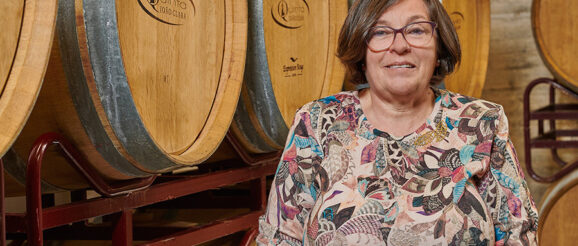Passion, tradition and innovation come together under the roof of João Clara Wines – INSIDE CARVOEIRO

João Clara’s legacy, a “labour of love”
– December 12, 2022
Staying relevant while preserving tradition can be a conundrum in the wine world. This ever-growing industry sees new producers, with creative projects attracting young and knowledgeable consumers, opening their winery doors faster than ever. Keeping up with new trends without losing your identity can be tricky for a winery.
On the slopes of the Alcantarilha hills, Edite Alves appears to have found the right formula for João Clara. With her daughters and son-in-law’s support, she is perpetuating her husband and father-in-law’s work while making her dreams come true by further growing and innovating the business.
João Maria Alves, better known as João Clara, bought what was a fruit farm in 1975 and, like most farmers did in those days, planted the first vines for home consumption. His son, Joaquim João, was the one who decided to take this production to the next level. He added new varieties – Touriga Nacional, Syrah, Alicante Bouschet, Aragonês, and Trincadeira – to the existing Negra Moles vines to make their first commercial wine.
Named after its creator, João Clara soon grew into a reputable boutique winery. The 26-hectare farm now includes 14 hectares of vines, almond, fig and carob trees, and an olive grove, whose fruit will soon be used to make branded olive oil.
Following in her husband’s footsteps, Edite is taking the business even further. Having been dependent on another local producer for their vinification for so many years, two years ago, with the inauguration of their new state-of-the-art winery, the family was finally able to do their own vinification. “Now we can smell and taste the wine when we want. It’s completely different,” exclaims the matriarch. “We can give it our personal touch. And thanks to modern equipment, we have increased the quality of the wine.”
The pioneering nature of this producer is evident. Led by consultant winemaker Joana Maçanita, the team is constantly working on creating new wines using different types of vinification techniques. This innovative mindset has been present since the very beginning. Joaquim João hired Joana’s brother, the young and daring winemaker António Maçanita, to make João Clara’s first red. Then came Claúdia Favinha, who created the single varietal 2011 Negra Mole, marking the grape variety’s big comeback, having been shunned by the wine world for decades. And now, Joana Maçanita has unleashed João Clara’s full potential by creating the region’s first GI (Geographical Indication) sparkling wine, its first GI Late Harvest, and the winery’s greatest adventure yet, the “vinho de talha”, made in amphoras, a technique instilled in Portugal by the Romans over 2,000 years ago.
Negra Mole, the first vine planted on the farm, is not only Portugal’s second-oldest variety, but it is also the Algarve’s most emblematic grape. Similar to Pinot Noir, it results in light-bodied reds that are best served chilled.
João Clara is proud to be elevating Negra Mole to new heights by vinifying it using different techniques, showcasing its versatility. They use it in their red blend and to make the Negra Mole Reserva, a light-bodied oak-aged wine with creamy and smoky notes and hints of almond and fig, revealing its terroir. They also used it to make their salmon-coloured rosé and newly released Blanc de Noir sparkling wine, made using the traditional method and bottle-aged for three years. And last but not least, the soon to be released amphora wine, which according to Edite, will be the complete opposite of the oak-aged Negra Mole.
But there is more to João Clara than Negra Mole. The winery’s portfolio includes wines for every taste and type of pairing. It even has an entry-level range – Às Claras – created for restaurants to recommend as local wine at an affordable price.
The whites are popular in this region, where seafood abounds. The João Clara white is a blend of Arinto, Alvarinho and Verdelho with a touch of Moscatel. Full of fruity aromas, it has notes of orange flower and lemon, ideal for seafood and salads. The Alvarinho, aged in oak for ten months, is creamy yet fresh and has a lot of fruit. As for the reds, the Syrah and the Reserva, both barrel-aged, have more body than the Negra Mole wines. They are made to accompany game and meat dishes. And, of course, the Late Harvest, a sweet wine that Edite is proud to say has won over many of the Algarve’s top chefs, some of whom have even included it as part of the pairing for their tasting menus.
With the growth of the wine industry also comes a boom in wine tourism. A growing number of visitors and wine enthusiasts look for experiences that will give them a taste of the Algarve’s new wines. “I never needed a diary to keep track of the bookings, but now I can’t do without one”, exclaims Edite. Although their infrastructures may have grown, she is still keen on hosting small groups of visitors, no more than twenty at a time. “We want them to have a VIP experience, to feel they have the producer’s complete attention. These clients come back, bring us other clients, and buy our wines in their country.”
Tours and tastings at João Clara, which must be booked in advance, range from a visit to the vineyard and winery followed by a three-wine tasting, to a premium tasting of the Reserva wines with a selection of snacks.
For the Alves family, winemaking is a labour of love: “There is a lot of passion and dedication in this project. We really want to build up what João Maria Alves and my husband left us.” João Clara’s legacy is sure to live on. Edite’s grandsons may only be helping to tread gra0pes for now, but as the saying goes, “as the twig is bent, so shall the tree grow”.
